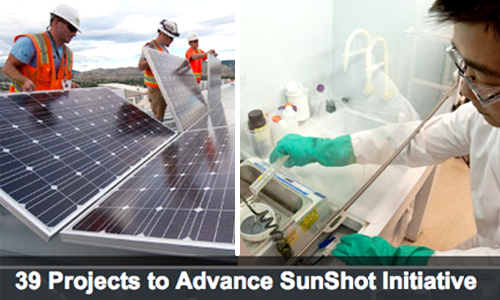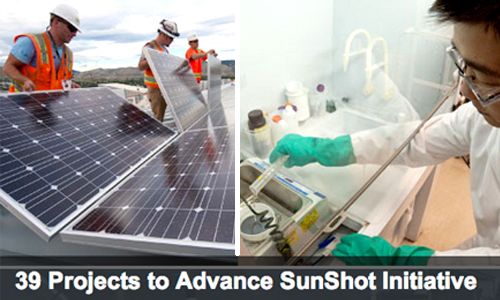
U.S. Department of Energy Awards $60M to Solar Research and Development

Wanting to build on an already growing industry, the U.S. Department of Energy (DOE) invested $60 million this week in solar energy research and development.
The awards were announced at the ongoing, three-day Solar Power International 2013 event in Chicago as a small portion of President Obama’s plan to reduce carbon pollution while supporting clean energy innovation.
The $60 million, issued by the DOE’s SunShot Initiative, is spread out over 40 awards and six funding programs, program director Minh Le told RenewableEnergyWorld.com. The awards support technologies that lower installation costs, increase performance, support solar cell efficiency and more.

“The tremendous growth in the U.S. solar industry over the past few years is helping to pave the way to a cleaner, more sustainable energy future that protects our air and water and provides affordable clean energy to more and more Americans,” Energy Secretary Ernest Moniz said. “Responsible development of all of America’s rich energy resources is an important part of President Obama’s Climate Action Plan and will help ensure America’s continued leadership in clean energy innovation.”
The SureShot Initiative is supporting the 119,000-employee solar industry by providing training for engineers, utility workers and student researchers. About $15 million of the money will help launch and support four regional training consortiums and their solar energy curriculum: Electric Power Research Institute in Knoxville, TN; Electricore Inc. in Valencia, CA; Missouri University of Science and Technology; and University of Central Florida/FEEDER Consortium.
The awards also give $17 million to companies to help commercialize their technologies, which range from mapping a rooftop’s solar potential to automated installation systems for photovoltaic plants. The SunShot Incubator Program has supported 50 solar startups since 2007, according to the DOE.
The DOE estimates that the country more than doubled generation of electricity from wind, solar and geothermal sources during Obama’s first term. The SunShot Intiative awarded $8 million to help utilities integrate renewable energy generation into the grid. The awardees include Washington D.C.-based PEPCO Holdings Inc., AWS TruePower of Albany, NY and the University of California, San Diego.
About an hour after the announcement, Le spoke about the wide scope of the awards, which will impact workers of today and tomorrow, as well as utilities and manufacturers.
“We expect our solar modules to last 25 to 30 years or so, but they can also last longer if we work on technologies that will improve its durabilities,” Le said. “Imagine being able to predict the weather and plan ahead whether you need to ramp up and down power plants in order to accommodate the intermittency of renewable integration.”

 233k
233k  41k
41k  Subscribe
Subscribe 
